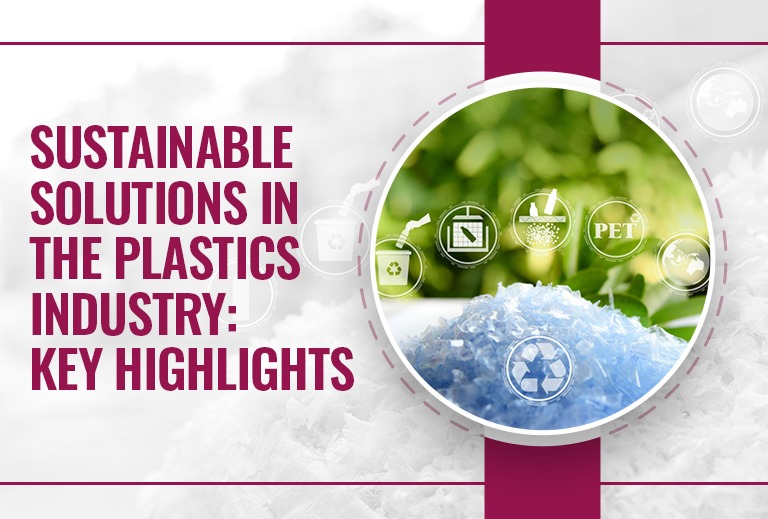Sustainable Solutions in the Plastics Industry: Key Highlights
Innovators, researchers, and organisations are spearheading efforts to develop eco-friendly alternatives for the plastic industry. Their focus is on helping discover sustainable solutions that can be put to good use for generations to come. Some of their solutions have already been implemented and are being honed to ensure their maximum potential. Let’s look at a few of these solutions that are being increasingly used in production processes worldwide:
1. Post-consumer plastic: Plastics that have completed their life cycle as consumer products and are no longer in use are collected through recycling or end up in landfills. These include plastic bottles, food containers and packaging materials.
By collecting and recycling post-consumer plastic, it can be transformed into new plastic products, reducing the need for virgin plastic production and reducing the overall environmental footprint associated with plastic consumption.
2. Bioplastics: Bioplastics are derived from renewable sources such as plants, algae, and agricultural waste. They offer a promising alternative to traditional petroleum-based plastics. Bioplastics are biodegradable, compostable, and can have a significantly reduced carbon footprint.
The development of advanced manufacturing techniques has expanded the range of applications for bioplastics, from single-use packaging to durable automotive components.
3. Recycling technologies: Traditional plastic recycling processes face challenges such as contamination, complex plastic compositions, and energy-intensive procedures. However, continuous research and innovation have led to advancements in recycling technologies. Chemical recycling, for instance, breaks down plastic waste into its molecular components, enabling the production of new plastics with properties comparable to virgin materials. This technology offers a more efficient and effective method of reusing plastic waste. Mechanical recycling involves sorting and processing different types of plastics for reuse, is also improving, contributing to a more circular economy.
4. Circular economy approaches: Organisations are increasingly adopting circular economy principles by designing products for reusability. This helps to promote the use of refillable and reusable containers, and encourage the use of recycled plastic in new products.
5. Extended Producer Responsibility (EPR): A lot of organisations have implemented EPR programs where plastic producers take responsibility for the entire life cycle of their products.
EPR encourages the recovery and recycling of valuable resources from products at the end of their life. By integrating recycling into the product life cycle, EPR helps conserve natural resources such as raw materials, energy, and water that would otherwise be required for manufacturing new products.
If you are interested in learning more about sustainable plastic situations, head over to Plastivision 2023 (December 7-11). This prestigious event will take place at the Bombay Exhibition Centre, Mumbai and will gather top experts from the plastic industry. To discover more about what’s in store for you at the event, please feel free to contact us at 022 6777 8846/48 or +91 99303 55494, or sanjeevani@plastivision.org.
Leave a Reply Cancel reply
Recent Posts
- Understanding The Materials That Are Used To Build Plastic Toys
- All You Need To Know About Food-grade Plastics
- A Glance At The Materials That Boost The Performance Of Plastics
- Understanding The Importance Of Exploring New Business Opportunities In The Plastic Industry
- Understanding The Importance Of Investing in R&D For The Plastic Industry
Categories
- 3D Printing
- AIPMA
- Automation
- Automobile Sector
- Bio Plastics
- Environment
- Innovations In Recycling
- Latest Innovations
- Molds & Dies
- News
- Packaging Industry
- Plastic
- Plastic Application
- Plastic Industry
- Plastic Market
- Plastic Myths
- Plastic News From The World
- Plastic Packaging
- Plastic Products
- Plastic Recycling
- Plastic Solar Cells
- Plastic Toys
- Plastic Waste
- Plastic World
- Plastics
- Plastics And Their Applications
- Plastics In Agriculture
- Plastics In Healthcare
- Plastics In Medical Industry
- Plasticulture
- Processing Machinery
- Recycling Machines
- Robotics
- Uncategorized
- Virtual Reality
Archives
- November 2023 (3)
- October 2023 (2)
- September 2023 (3)
- August 2023 (3)
- July 2023 (3)
- June 2023 (3)
- May 2023 (2)
- April 2023 (2)
- March 2023 (2)
- February 2023 (2)
- January 2023 (2)
- December 2022 (3)
- November 2022 (1)
- October 2022 (1)
- September 2022 (2)
- August 2022 (1)
- July 2022 (3)
- May 2022 (3)
- March 2022 (2)
- February 2022 (1)
- January 2022 (1)
- September 2021 (2)
- August 2021 (3)
- July 2021 (4)
- June 2021 (4)
- May 2021 (3)
- April 2021 (2)
- March 2021 (4)
- November 2019 (8)
- October 2019 (8)
- September 2019 (8)
- August 2019 (8)
- July 2019 (8)
- June 2019 (8)
- May 2019 (8)
- April 2019 (8)
- March 2019 (8)
- February 2019 (11)
- January 2019 (8)
- December 2018 (8)
- November 2018 (12)
- October 2018 (12)

